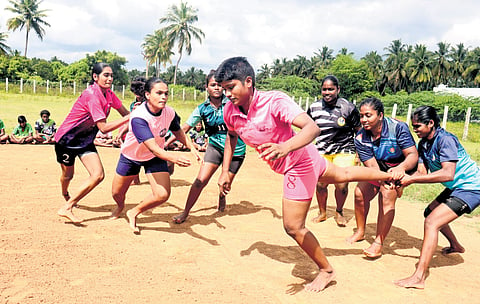

VELLORE: Nestled quietly amidst misty mountains is Erikuttu, a village in Vellore’s Pernambut. At the crack of dawn, a cohort of girls is already busy practising kabaddi, a popular contact team sport.
Leading them in front is D Sanjai Gandhi, a 31-year-old passionate coach and a former national-level kabaddi player himself. He trains young girls across the state in the sport.
After practice, the 25-strong team of girls head back to the hostel that Sanjai set up in 2019 before getting ready to head to their respective schools and colleges. The one-acre field where they practise was lent to Sanjai by a nearby resident.
Practice sessions during weekends and holidays see the highest attendance and are therefore intense, as students from other districts would join them. These students usually come from underprivileged families. They also need to balance their daily chores with their practice sessions.
Their parents are employed as daily wage labourers in construction, agriculture, or domestic work. A shared passion for kabaddi brought these students together to Sanjai’s hostel. Every month, the team attends a few matches, and the prize money they receive is used to run the hostel. Sanjai also borrows money to meet expenses, if this doesn’t suffice.
Sanjai grew up in Erikuttu as the second youngest of eight siblings in a poor family in the village. As he lost his parents young, he found solace in kabaddi, a sport that kept his entire village fervent. He learned kabbadi from members of his family, specifically his brother D Muniyandi and his uncle K Cholapandian.
Sanjai recalls, “We had at least 10 teams here and always wanted to outperform teams from the neighbouring villages.”
Sanjai’s playing career ended abruptly in 2010, due to a shoulder injury in his first national competition at Jammu and Kashmir. This led him to take up coaching to remain connected to the sport. Taking his national competition coach Kalaiselvan’s advice, he shifted his focus to training girls.
What began in 2012 as a training centre for 10 students at a local tuition centre quickly grew to a 60-member team of fighters. Sanjai noticed that the girls were passionate and disciplined in the sport, unlike boys who simply aimed to win local matches.
He soon shifted his focus to training girls in the sport, whose perseverance led them to success at the state level, which in turn, attracted more parents who wanted to secure the best opportunities for their children, through sports quotas in education and employment.
One of Sanjai’s first students, Divya M, has gone on to become a star player. At 26, she has already participated in several All India University level matches and national kabaddi games. Almost all of Sanjai’s senior students are national-level kabaddi players.
In 12 years, he has trained over 300 girls from various districts like Tirunelveli, Karaikudi, Erode, and Chennai, and many have even gone on to secure jobs in the police force through sports quota. Sanjai has also been instrumental in helping them get free education through the same quotas.
However, his commitment to students’ excellence has put him under financial strain. He currently owes around Rs 10 lakh to lenders, with monthly interest payments exceeding Rs 50,000.
To sustain himself and this endeavour, Sanjai works as a daily wage labourer in tree-cutting and construction on the side, allowing him to earn around Rs 800 a day. The running costs of the hostel come to Rs 50,000 a month, covering rent, food, and transportation.
Sanjai’s dedicated efforts have come with personal sacrifices. Divya recalls a time when they both needed money to travel to college and he chose to drop out to facilitate her education.
“We both needed Rs 100 each to travel to our respective colleges. With a daily wage job of transporting sand, Sanjai could earn only Rs 100 and he chose to spend it for my conveyance, over his,” she said.
Although he has a certificate to coach kabaddi from the National Institute of Sports in Patiala, he prefers not to take up a coaching job at any university, as it would limit the time he can spend with his team.
The idea for establishing a hostel blossomed in 2019 after Divya mentioned that three meals a day would improve her performance, in a TV show. Taking this cue, Sanjai established a hostel that provides students meals, though he still struggles to afford protein-rich foods like eggs or milk.
Initially, Sanjai’s family was against him spending on training girls, but after seeing the medals and immense progress that the team achieved, they softened their stance. Physical Director of Sethupathi Arts College, Ramanathapuram, S Manimuthu, said, “Even in debt, Sanjai does not hesitate to help someone with money or assistance with school admissions.”
During the pandemic, Sanjai used Rs 5 lakh from his savings to buy rations for the villagers and borrowed another Rs 3 lakh to build a house for an elderly woman in need.
Coach Sanjai has built a formidable kabaddi team, but a lack of mats limits their national success.
“If we had a mat, more of us could reach and win nationals,” says G Aarthiga, one of his players, emphasising a challenge beyond Sanjai’s ability to solve alone. After training on muddy fields, they face challenges adjusting to mats used in national games, affecting their speed and grip.
(Those interested in supporting the team may contact Sanjai at 9080725904)